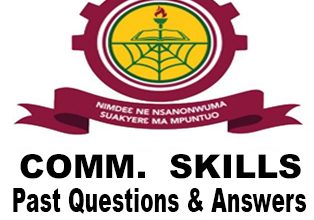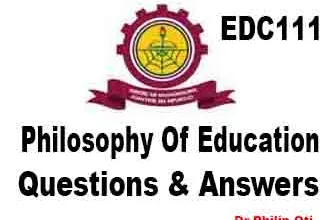AAMUSTED
Summary of Philosophy Of Education (Chapter Two 2 & 3)
Aamusted Philosophy of Education EDC 111
CHAPTER TWO
PHILOSOPHY OF EDUCATION
OBJECTIVES
- PHILOSOPHY OF EDUCATION
- Origin of the Term Education
- What is Education?
- What is Philosophy of Education?
- Some philosophical definitions of Education
- Determinants of Philosophy of Educ.
- Implications/Significance of the Study of Philosophy of Education to the Classroom Teacher
Recommended
Summary of Philosophy Of Education (Chapter One 1)
Summary of Philosophy Of Education (Chapter Two 2 & 3)
Summary of Philosophy Of Education (Chapter Two 4)
Summary of Philosophy Of Education (Chapter Two 5)
Summary of Philosophy Of Education (Chapter Two 6)
Summary of Philosophy Of Education (Chapter Two 7 & 8)
ORINGIN OF THE TERM EDUCATION
- The Term education owes its origin to the two Latin words: ‘Educare’ and ‘Educere’.
- Educare’- means ‘to nourish’, ‘to bring up’, ‘to raise’
- Educere’- means ‘to bring forth’, ‘to draw out’, ‘to lead out’.
- Educatum’- means- ‘the act of teaching and training’.
- “Education therefore consists of leading out the innate knowledge, virtues, and powers of the child, making the potential actual”
SOME PHILOSOPHICAL DEFINITIONS OF EDUCATION
- Aristotle “Education is the creation of a sound mind in a sound body”.
- Froebel “Education is the unfoldment of what is already enfolded in the germ. It is the process through which the child develops his innate qualities”
- Mahatma Gandhi “By education I mean an all round drawing out of the best in child and men-body, mind and spirit”.
- Pestalozzi “Education is the natural, harmonious and progressive development of man’s innate powers”.
- James Drever “Education is a process in which and by which knowledge, character, and behaviour of the young are shaped and moulded”.
- John Dewey “ Education is the process of living in a contituous reconstruction of experiences by developing the capacities of the individual which will enable him to control his environment and fulfill his possibilities”
PHILOSOPHY OF EDUCATION
- Philosophy and education are closely interrelated.
- Plant of education draws its nourishment from the soil of philosophy.
- Education is application of philosophy or philosophy of education is applied philosophy.
- Philosophy and education are like the sides of a coin, presenting different views of the same thing, and that one is implied by the other.
- Philosophy of education offers a definite set of principles and establishes a definite set of aims and objectives.
MEANING OF EDUCATIONAL PHILOSOPHY
- Educational philosophy is the branch of philosophy which provides answers to the educational issues of why to educate (aim), whom to educate (learner), who should educate (teacher), where to educate (school), what to educate (curriculum), how to educate (methods), what to use to educate (materials), when to educate (time), and so on.
- In doing this, the educational philosopher tries to critically analyze the content and processes of the educational system and the challenges that emanate from it.
- Philosophy of education may be defined as the application of the fundamental principles of a philosophy of life to the work of education.
- One can therefore conclude that philosophy of education concerns the utilization of the methods, tools, and techniques of philosophy in investigating problems of educational system.
- Thus, it is the educationists’ approach to solve educational problems by referring to the philosophy of society.
Recommended
Summary of Philosophy Of Education (Chapter One 1)
Summary of Philosophy Of Education (Chapter Two 2 & 3)
Summary of Philosophy Of Education (Chapter Two 4)
Summary of Philosophy Of Education (Chapter Two 5)
Summary of Philosophy Of Education (Chapter Two 6)
Summary of Philosophy Of Education (Chapter Two 7 & 8)
DETERMINANTS OF PHILOSOPHY OF EDUCATION
Philosophy of education is built upon the following basic criteria. A genuine national philosophy of education must possess these distinct components.
- The type of “Man” the society wants to produce.
- The nature or type of knowledge worth acquiring and the process of acquisition.
- The value systems-the things the society cherish or considers valuable or worth acquiring.
Implications of the Study of Philosophy of
Education to the Classroom Teacher
- To make teaching-learning process more effective and attractive according to interest, inclinations and abilities of the child.
- To bring out an all-round personality development in the child and prepare him to stand on his own feet.
- Studying educational philosophy helps the teacher to find solutions for various educational issues.
- This will guide teachers to select and use appropriate teaching methods suitable for the learners.
Recommended
Summary of Philosophy Of Education (Chapter One 1)
Summary of Philosophy Of Education (Chapter Two 2 & 3)
Summary of Philosophy Of Education (Chapter Two 4)
Summary of Philosophy Of Education (Chapter Two 5)
Summary of Philosophy Of Education (Chapter Two 6)
Summary of Philosophy Of Education (Chapter Two 7 & 8)
Implications of the Study of Philosophy of Education to the Classroom Teacher
- Philosophy of education enables the classroom teacher to abandon his/ her perceived and prejudiced notions about issues.
- It enables the teacher to be broadminded in the way he thinks about educational issues.
- it guides him/her in the way he organizes the teaching learning process.
- Knowledge of philosophy of education enhances the output of the classroom teacher.
- To expand our knowledge and experiences, and implement them in the educational practices.
- To develop education as a powerful tool to bring about social, cultural, political and economic change in society.
- Philosophy of education helps to sharpen the moral consciousness of the teacher trainee.
- It increases the ability of a teacher to think and reflect or ponder on educational policies and practice.
CHAPTER THREE
PHILOSOPHY AND AIMS OF EDUCATION
OBJECTIVES
- PHILOSOPHY AND AIMS OF EDUCATION
- Levels of Aims of Education
- Types of Aims of Education
- The Philosophical Basis of Education in Ghana
AIMS OF EDUCATION
- There are three basic levels of education aims every education system aspire to achieve. These are;
- Immediate Aims
- Proximate Aims
- Ultimate Aims
Recommended
Summary of Philosophy Of Education (Chapter One 1)
Summary of Philosophy Of Education (Chapter Two 2 & 3)
Summary of Philosophy Of Education (Chapter Two 4)
Summary of Philosophy Of Education (Chapter Two 5)
Summary of Philosophy Of Education (Chapter Two 6)
Summary of Philosophy Of Education (Chapter Two 7 & 8)
Immediate aims
- The immediate aim is short term and very measurable.
- It can be the aims of subjects, topics or even objectives set by the teacher for a classroom lesson.
- For instance, in a Philosophy of Education course, the immediate aim can be by the end of the course, the student should be able to examine the major schools of philosophy and how they influence the aims, curricular and methods of teaching.
Proximate aims
- Proximate aims are given to the various levels of education.
- For instance, what is expected of the educational system after K. G, Primary, JHS, SHS or Tertiary.
- In Ghana, at the end of primary school course the pupils should have been equipped with the skills of numeracy.
Ultimate Aims
- The ultimate aim of education defines the society’s expectation of the educational system at the very end.
- Some of these aims are quite difficult to achieve holistically.
- There are three main characteristics of ultimate aim of education.
- In the first place,
- it is long term,
- it is social in character or society based and finally,
- it caters for the individual’s life long needs
Forms of Aims of Education
- Social Aims of Education
- Economic Aims of Education
- Political Aims of Education
- Moral and Spiritual Aims of Education
Social Aims of Education
- Literacy- ability to read and write
- Numeracy – ability to add, subtract, multiply, and divide.
- Critical and logical thinking or the development of creative enquiry
- Manipulative skills
- Aesthetic skills- art, painting, drama, poetry.
Recommended
Summary of Philosophy Of Education (Chapter One 1)
Summary of Philosophy Of Education (Chapter Two 2 & 3)
Summary of Philosophy Of Education (Chapter Two 4)
Summary of Philosophy Of Education (Chapter Two 5)
Summary of Philosophy Of Education (Chapter Two 6)
Summary of Philosophy Of Education (Chapter Two 7 & 8)
Economic Aims of Education
- Technical/Vocational/Commercial skills are to be developed with the view to satisfying the manpower requirement of the country.
- The aim is to train individuals in occupations such as
- Computer literacy to equip the citizenry with employable skills
- Human resource capital development.
- Self-reliance. To wean the country from, external loans, donor support and foreign aids (Ghana beyond aid).
- NB// Notwithstanding the economic aim of education, it must not be “education for survival”
Political Aims of Education
- Training for citizenship– Education should produce patriotic and informed active citizens.
- Political Stability– Education should awaken political consciousness. Brings about understanding and help minimize dispute.
- National Unity– train students to bring about national unity. They should avoid disputes.
- Students should be critical in their thinking so that when they go out, they could settle disputes.
- To realize these aims, the schools can teach Social Studies, History, Government, Citizenship education (reciting National pledge and Anthem)
Moral and Spiritual Aims of Education
- Education should produce honest, truthful and courageous men and women who are God-fearing.
- Character training. Good moral attitudes and values such as honesty, respect to the aged, discipline, and chastity among recipients.
- Such good morals should rid society of corruption, stealing, murder, fornication, prostitution, rape, etc.
- Subjects taught to promote this include, Religion, RME, Citizenship education.
- Worship and devotion in schools can also help to promote moral education.
THE PHILOSOPHICAL BASIS OF GHANA’S EDUCATION SYSTEM.
- Development of Nationalism
- Inculcation of Sound Moral Values
- Development of Internationalism and Hospitability
- Development of Scientific Attitude
- Development of Citizens with Strong Mental and Intellectual Capacity
- Development of Cultural Identity
- Development of Quality Human Resource Base with Employable Skills
Recommended
Summary of Philosophy Of Education (Chapter One 1)
Summary of Philosophy Of Education (Chapter Two 2 & 3)
Summary of Philosophy Of Education (Chapter Two 4)
Summary of Philosophy Of Education (Chapter Two 5)
Summary of Philosophy Of Education (Chapter Two 6)
Summary of Philosophy Of Education (Chapter Two 7 & 8)




